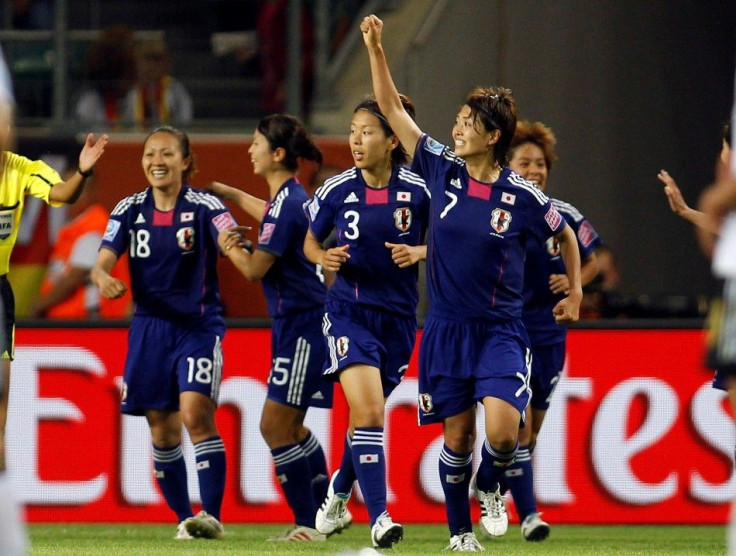First Class Citizens? The Surprising Truth About Women’s Equality In Japan
ANALYSIS

Last week, members of Japan's female soccer team who are contending for a gold medal in the 2012 London Olympics flew from Tokyo to Paris. By all accounts, the flight went smoothly -- but the women could have used a bit more leg room on the 12-hour flight.
The athletes, who became World Cup champions last year and are serious gold medal contenders for the upcoming Olympic Games, flew in premium economy class. Meanwhile, members of the men's team, which has slim chances of medaling in London, flew first class.
Women's team captain Homare Sawa, 33, spoke to reporters after arriving in Paris.
I guess it should have been the other way around, she said, according to Agence France-Presse. Even just in terms of age, we are senior.
The seating slight has occasioned new scrutiny into gender equality issues in Japan. There, women's overall level of professional achievement is not as high as it could be.
Tale As Old As Time
Of course, women face equity problems in just about every corner of the globe due to a number of factors: biological clocks, a lack of childcare options, salary inequalities, and the generally pervasive notion that men should be breadwinners and women should be caretakers. But in Japan, the inequality seems to be especially problematic.
Consider two UN-sponsored studies, both from last year. One ranks countries according to their development level, while the other ranks them according to their level of gender equality.
In terms of development, Japan is number 12 out of 187 surveyed countries -- an excellent score that puts the economic powerhouse in the very top tier worldwide.
But in terms of gender equality, Japan comes in at number 98 -- right between Malaysia and Kenya -- in a list of 135 countries surveyed.
For other countries on these lists, development and gender equality tend to go hand in hand; the correlation isn't perfect, but the general pattern is clear. That Japan is doing so well in terms of human development, but so poorly in terms of gender equality is a sure sign that something is seriously amiss.
Culture could be the culprit, although such a diagnosis is difficult to apply with certainty. It is tempting to say that Japanese women lag in terms of equality due to historical mores: the geisha phenomenon of the 18th century, for instance, or the male-oriented samurai codes that have influenced popular culture since the 10th century. But a history of inequality is endemic to various other cultures as well, so such explanations are speculative at best.
There is one interesting cultural difference that seems fairly unique to Japan -- linguistic differentiation between genders. According to some reports, females tend to speak more politely and more elaborately than males, although there are disputes as to whether that trend is on the way out, or whether hierarchical differences are more to blame.
Recall Sawa's statement to reporters on Monday regarding her seat assignment: I guess it should have been the other way around. If the language-differentiation theories are true, perhaps a man might have omitted the 'I guess' altogether.
Making Moves
Culture, language, history -- whatever the actual cause of gender inequity, some Japanese policy-makers are focused on effecting a real change. The first gender-focused employment equality law was implemented in 1986, and that helped to bring women's rights into the public discourse.
Today, there are government initiatives in place that aim to have women making up at least 10 percent of private sector management positions and 5 percent of governmental managerial positions by 2015. The Financial Times reports that today, women occupy only 6.2 percent of private sector management positions and 2.2 percent of governmental managerial positions.
In short, there's still a long way to go.
But leave it to international sporting events to call attention to the internal issues of individual countries. Just this year, the FIFA games scheduled for 2022 in Qatar have shone a spotlight on migrant workers' rights abuses there. And the Euro 2012 tournament led to a global examination of racism in Ukraine and Poland.
In a similar way, perhaps this outcry over female athletes' flight seat assignments will help motivate Japan to put even more resources into solving an endemic problem that, still today, prevents the country from living up to its full potential.
Meanwhile, Sawa and her teammates are determined to live up to their own potential -- discriminatory seat assignments or not.
When we won the World Cup, our seats were changed to business class for our return flight, she said. I hope we can produce a good result again and be treated the same way.
© Copyright IBTimes 2025. All rights reserved.






















